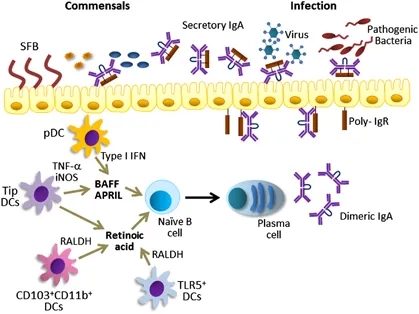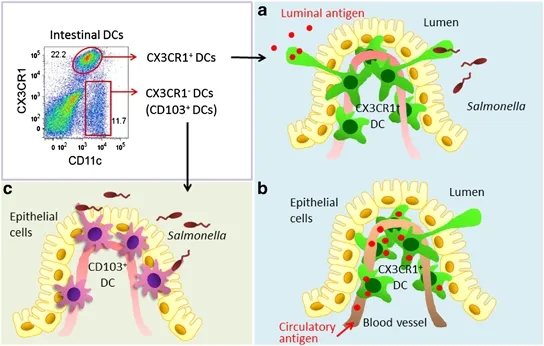Vitamin A and Retinoic Acid Studies
Mucosal dendritic cells shape mucosal immunity
Sun-Young Chang, Hyun-Jeong Ko & Mi-Na Kweon
Experimental & Molecular Medicine volume 46, pagee84(2014)Cite this article
Abstract
Dendritic cells (DCs) are key modulators that shape the immune system. In mucosal tissues, DCs act as surveillance systems to sense infection and also function as professional antigen-presenting cells that stimulate the differentiation of naive T and B cells. On the basis of their molecular expression, DCs can be divided into several subsets with unique functions. In this review, we focus on intestinal DC subsets and their function in bridging the innate signaling and adaptive immune systems to maintain the homeostasis of the intestinal immune environment. We also review the current strategies for manipulating mucosal DCs for the development of efficient mucosal vaccines to protect against infectious diseases.Introduction
Mucosal tissues contain various lymphoid cells. Of these, accessory cells act as sentinels to sense invading organisms, T cells attack and clear pathogens, and B cells secrete IgA. These cells reside among large numbers of commensal microorganisms that also contribute to host defense through metabolic competition1 or by enforcing the host¨s immune barrier.2 To maintain homeostasis with commensals on mucosal surfaces, there is a specialized immune system associated with mucosal environments. The intestine!especially the small intestine!strongly drives immune suppression against exogenous antigens. Food antigens can induce oral tolerance by generating inducible regulatory T (Treg) cells.3 Antigen-presenting cells, such as dendritic cells (DCs) or macrophages, survey the mucosal environment using innate pattern recognition receptors. These cells can adjust and balance the suppressive regulation of commensals or innocuous antigens and protect against pathogens by generating various types of helper T (TH) and CD8+ T cells as well as secretory IgA (SIgA) antibodies. Before efficient mucosal vaccines can be developed, it is imperative to achieve an understanding of both the mucosal immune system and the regulatory mechanisms of immune cells. Further, strategies to overcome regulatory mechanisms will be essential. Here, we provide an overview of the intestinal immune systems, focusing on the unique subsets and functional features of intestinal DCs, and consider key biological and technical aspects of mucosal vaccine design. We then summarize the current status of mucosal vaccine development, including strategies involving modulation of mucosal DC activation....
RA is essential for maintaining the intestinal immune environment because it is a determinant for antibody isotype, TH cell and DC subsets.32, 33 The main goal of a mucosal vaccine is to elicit vaccine antigen-specific IgA production in the mucosal tissue of the infection route.
Secretory IgA production by intestinal DCs. Intestinal pDCs and tip DCs induce IgA production by expressing BAFF and APRIL. Intestinal CD103+CD11b+ DCs, tip DCs and TLR5+ DCs express RALDH2 that is converted into RA and can be used for IgA production.
Antigen uptake using intraepithelial dendrites of lamina propria DCs. (a) CX3CR1+ DCs can sample Salmonella organisms as well as luminal soluble bacterial antigens by extending long dendrites across the epithelium via a CX3CR1-dependent mechanism. (b) CX3CR1+ DCs facilitate the surveillance of circulatory antigens. (c) Intraepithelial CD103+ DCs can be recruited into the intestinal epithelium by luminal bacteria to sample bacterial antigens.Mucosal dendritic cells shape mucosal immunity | Experimental & Molecular Medicine
https://www.nature.com/articles/emm201416

